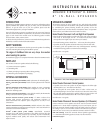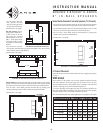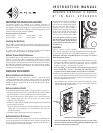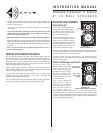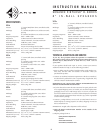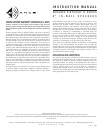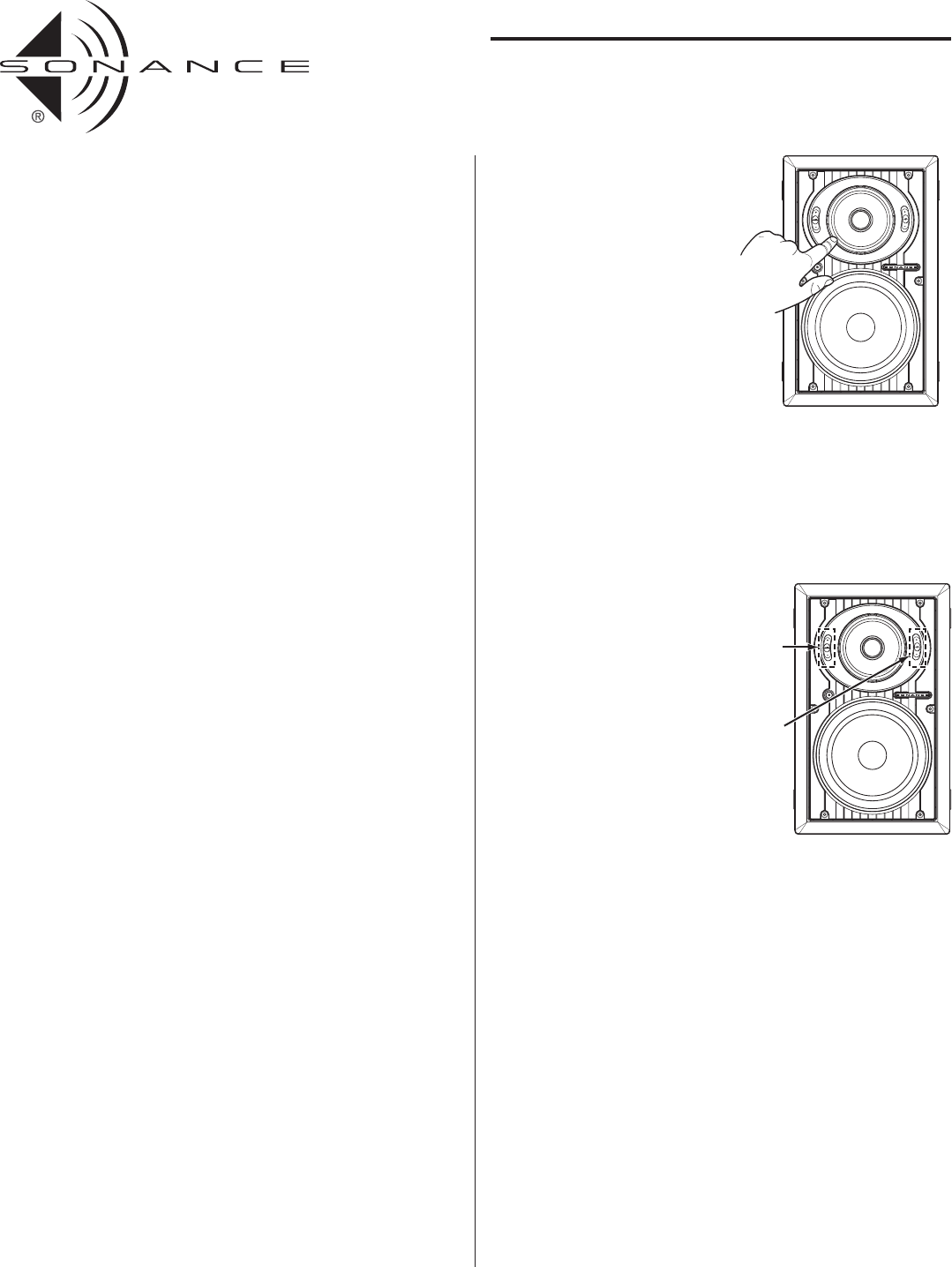
4
3. Tighten the six screws on the front of the speaker baffle. The RotoLock
clamps will automatically rotate into position and begin clamping the
speaker (see Illustration 8).
• When you notice resistance on the screws the speaker has been clamped
successfully.
Note: The speaker flange is designed to flex and conform to any small
imperfections in the ceiling surface. Do not tighten the screws so
much so that the flange bows-out.
Important: Always use low-torque settings; NEVER over-tighten.
4. Attach the grille after the speaker has been installed. Insert about half of the
grille into the groove at the edge of the speaker. Gently fit the remaining half
of the grille by working around the speaker, fitting the grille into the groove
as you go.
Note: You can adjust the torque applied to the RotoLock screws to
achieve a proper grille fit.
PAINTING THE SPEAKERS AND GRILLES
You can paint the speakers and grilles before installing them, which will
eliminate the “paint scar” if the speaker ever needs to be removed for service.
You can also paint the speakers after installation, but before the grilles are
attached. All Virtuoso D-series speakers come from the factory fitted with a
plastic ‘paint plug’. Use the paint plug to protect the speaker drivers while the
flange is being painted along with the wall.
Sonance always suggests painting the grille separately from the speaker.
Before painting,carefully remove the under-grille cloth. It is held in place with
a light tacking glue that makes it easy to remove.
Spray the grilles with thinned paint (5 parts thinner to 1 part paint), being
careful not to plug the holes. Too heavy a coat of paint on the grille will
adversely affect the sound of the speaker.
Once the grilles and flange are painted and dry,replace the under-grille cloth,
remove the paint plug from the speaker flange and install the grille.
ADJUSTING YOUR SPEAKERS
Pivoting Sonic Eye
®
All Virtuoso D-series speakers have a
pivoting Sonic Eye® (midrange/tweet-
er assembly). These pivoting drivers
allow you to direct sound toward or
away from the listening area.
If you’re using the speakers in stereo or
as the front L/C/R speakers in a home
theater, pivot the Sonic Eye directly
towards the listening area. This can be
especially helpful if the speakers are
widely-separated and the music fails
to blend into a central sonic image.
If you’re using the speakers as surround channel speakers in a home theater, you
can create a more diffuse, spacious surround effect by aiming the Sonic Eye
towards a wall or window,away from the listeners.
To pivot the Sonic Eye, apply light pressure to the outside edge of the
midrange, as shown in Illustration 9. Do not apply pressure to the midrange
cone or the tweeter dome.
Tweeter and Midrange Level Controls
The Virtuoso V832D, V833D
and V834
D have a tweeter level
control switch that lets you
boost or cut the tweeter’s level
by 3dB. The V833
D and V834D
also have a midrange level
control that lets you boost or
cut the midrange level by 3dB.
(See Illustration 10.)
Once you have installed the
speakers, listen to a variety of
music that you are familiar
with. If the music all tends to
sound too bright or dull, use
the Tweeter Control to
compensate.If the music all tends to have too much or too little presence,use
the Midrange Control to compensate. If some recordings sound dull or lack
presence and some sound bright and have too much presence, the speaker is
accurately reproducing differences in the recordings, and you should leave the
control in the middle (0dB) position.
INSTRUCTION MANUAL
SONANCE VIRTUOSO
®
D-SERIES
8” IN-WALL SPEAKERS
Illustration 9:
Pivoting the Sonic Eye
Midrange Control
(V834D& V833D)
Tweeter Control
(V834D, V833D
&V832D)
Illustration 10:
Tweeter and Midrange Level Controls



